#Adil Babikir
Text
Tayeb Salih: 'Yes, the Nile Speaks to Me'
Introduced and translated by Adil Babikir
“I was always fascinated by the river from my very early childhood”, Tayeb Salih once said. “And I think I somewhat understood what the river is trying to say.”
That comes as no surprise. For all those who live in northern Sudanese villages by the Nile, the river has always had an overwhelming presence in all aspects of life there. That influence…
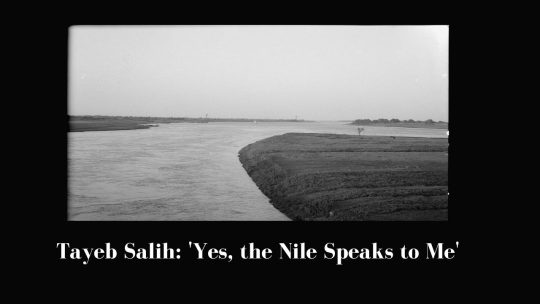
View On WordPress
1 note
·
View note
Text
Book Digest: Otoniya J. Okot Bitek, Adil Babikir, Stephen Buoro, Kweku Abimbola
We wrap up book news for our readers in our regular Book Digest segment with books from Otoniya J. Okot Bitek, Adil Babikir, Stephen Buoro, and Kweku Abimbola.
Song and Dread by Otoniya J. Okot Bitek
Publisher: Talon BooksDate: March 15, 2023Genre: PoetryLanguage: EnglishWhere to find it: Click here.
Otoniya J. Okot Bitek
Otoniya J. Okot Bitek
Otoniya J. Okot Bitek is a poet and scholar. Her…

View On WordPress
0 notes
Quote
Every day I get more convinced
that I was created for you alone.
It is through your eyes that I saw the world;
on your lips my poems were born.
Without you,
my life is a wasteland.
I am colorless,
tasteless,
smelling like a land never visited by rain.
Rawda el-Haj, tr. & ed. Adil Babikir, Modern Sudanese Poetry: An Anthology; “Heart’s Confessions”
#literature#poetry#rawda el-haj#modern sudanese poetry: an anthology#lovers at the edge of eros#we sit in each other's souls#you you you#sudanese lit#m#x
3K notes
·
View notes
Text

Idris Jamma, tr. by Adil Babikir, from Modern Sudanese Poetry: An Anthology; “In the Spring of Love”
[Text ID: “I lost pace with the past; / sorrow engrossed deep at heart.”]
#idris jamma#sudanese literature#excerpts#writings#literature#poetry#fragments#selections#words#quotes#poetry collection#typography#poetry in translation
684 notes
·
View notes
Text

Rawda El-Haj, "Heart's Confessions," trans. Adil Babikir, in Modern Sudanese Poetry
29 notes
·
View notes
Text
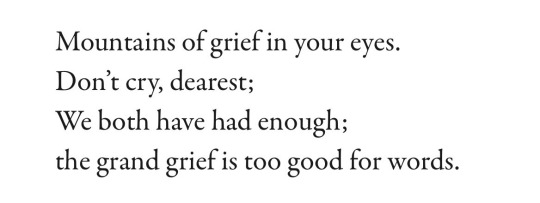
Mohammed el-Fayturi, tr. & ed. Adil Babikir, Modern Sudanese Poetry: An Anthology; “Yaaqut al-Arsh”
232 notes
·
View notes
Text
Every day I get more convinced
that I was created for you alone.
It is through your eyes that I saw the world;
on your lips my poems were born.
Without you,
my life is a wasteland.
I am colorless,
tasteless,
smelling like a land never visited by rain.
-Rawda el-Haj, tr. & ed. Adil Babikir, Modern Sudanese Poetry: An Anthology; “Heart’s Confessions”
37 notes
·
View notes
Text

“I am afraid I am slipping away from me.”
~•Abdulqadir Alkutayabi•~
#Abdulqadir Alkutayabi, tr. & ed. Adil Babikir, Modern Sudanese Poetry: An Anthology; “I Miss Something”
19 notes
·
View notes
Text
through your utterance I enter you; through your pores.
Azhari Mohammed Ali, tr. & ed. Adil Babikir, Modern Sudanese Poetry: An Anthology; “A Starting Point”
2 notes
·
View notes
Text
“Every day I get more convinced that I was created for you alone. It is through your eyes that I saw the world; on your lips my poems were born. Without you, my life is a wasteland. I am colorless, tasteless, smelling like a land never visited by rain.”
— Rawda el-Haj, tr. & ed. Adil Babikir, Modern Sudanese Poetry: An Anthology; “Heart’s Confessions”
#dark academia#light academia#books and libraries#books & libraries#bookblr#booklr#literature#spilled poetry#writing#writers on tumblr#writings#poetsontumblr#art#quotes#life quotes#desiblr#poetry#love poetry#spilled ink#spilled words#spilled thoughts#library#philosophy#bookish#bookworm#books#reading#words#wordsnquotes
6 notes
·
View notes
Text
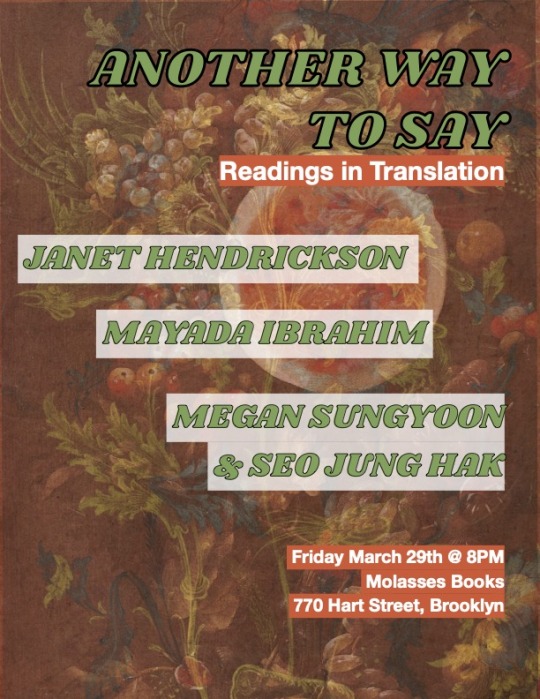
This month features Janet Hendrickson and her translation of Francisco Pino's Unfaithful Translation of the Raven by Edgar A. Poe, ALTA Travel Fellow (2023) Mayada Ibrahim, who's co-translation of Samahani by Abdelaziz Baraka Sakin with Adil Babikir is forthcoming from Foundry Editions, as well as Korean poet Seo Jung Hak and translator Megan Sungyoon with The Cheapest France in Town (World Poetry), "You, enjoying loose obsession, You, waiting for something mystical. You, lonely. You, bored. Pre, ssitp, ressit, press it."
***
Janet Hendrickson translates from Spanish and Portuguese to English. Her experimental translation of Treasure of the Castilian or Spanish Language (New Directions, 2019), which turns a 1611 dictionary by Sebastián de Covarrubias into a series of prose poems, was longlisted for a PEN Award for Poetry in Translation. She also translated The Future Is Not Ours (ed. Diego Trelles Paz, Open Letter, 2012), a generation-defining anthology of new Latin American fiction. She teaches writing and translation in Liberal Studies at NYU.
Mayada Ibrahim is a translator, editor, and writer based in Queens, New York, with roots in Khartoum and London. She works between Arabic and English, and edits at Tilted Axis Press.
Megan Sungyoon translates between languages and across genres. Sungyoon’s work has appeared in World Poetry Review, Copper Nickel, Asymptote, Columbia Journal, SAND Journal, and The Margins, among others. Based in Seoul and New York, Sungyoon holds a BFA from the School of the Art Institute of Chicago and an MFA in Poetry and Literary Translation from Columbia University. The Cheapest France in Town (World Poetry) is her first book of translation.
A native of Seoul, poet Seo Jung Hak made his debut with four poems in the Winter 1995 issue of Literature and Society. His first poetry collection, The King of Adventure and Aristocrats of Coconut was published in 1998 by Moonji Publishing, one of the most important literary publishers in South Korea. The Cheapest France in Town (World Poetry, 2023), originally published by Moonji in 2017, marks his debut in English translation.
0 notes
Text
Al-Gaddal: a Revolutionary Brand of Bedouin Poetry
By Adil Babikir
AUGUST 4, 2023 — Sudanese poet Mohammad Taha al-Gaddal, who passed away on this day in 2021, will be remembered for his trailblazing role in taking traditional Bedouin poetry to new levels and establishing it firmly as a medium for addressing the themes of modern life.
The poet, born in 1952, stands out for his ability to seamlessly weave existential themes, such as people’s…
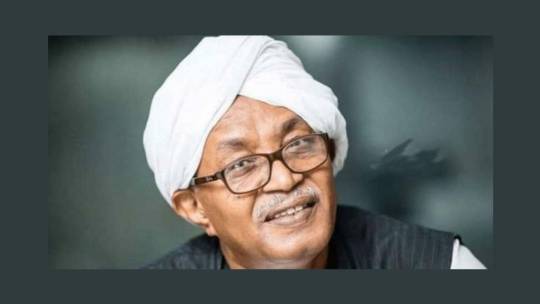
View On WordPress
0 notes
Text
Extract from modern Sudanese poetry an anthology, African poetry book series
The Silent Rose
Zarqaa of Yamama. Refers. To a legend of keen sighted girl. Who lived in the Arabia Peninsula. She was blessed with eyes. Not only beautiful.but could see long distances away. She would warn her tribe of invasion.
One invasion attempt
Approaching army covered themselves in tree branches. to avoid her radar. When Zarqaa warned her tribe. An army of trees was approaching. They dismissed her warning as nonsense. Until the enemy attacked them.
1 note
·
View note
Text

Mohammed el-Makki Ibrahim, tr. & ed. Adil Babikir, Modern Sudanese Poetry: An Anthology; from “The Green October” in “Songs for October”
[Text ID: The land is singing your green name, O October]
#literature#poetry#mohammed el-makki ibrahim#modern sudanese poetry: an anthology#soil we walk upon#typography#sudanese lit#m#x
470 notes
·
View notes
Photo
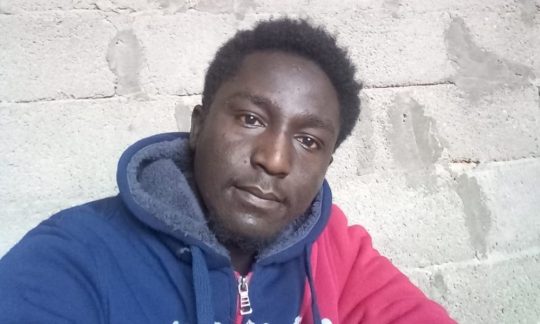
Abdel Wahab Yousif (aka Latinos)
A young Sudanese poet’s prediction of his fate came true last week when he drowned in the Mediterranean.
Abdel Wahab Yousif, better known as Latinos, died when a rubber boat packed with African immigrants sank into the sea shortly after setting off from Libya on its way to Europe.
Latinos was well-known among the young generation of poetry fans in Sudan. The cocktail of hardships he had endured in his short life colored his verse with thick shades of melancholy:
I’ll run away from a homeland scourging my back with lashes day and night;
From a woman who doesn’t know how to feed my soul from her body’s nectar.
I’ll run from everything,
nonchalantly embrace demise.
Born to a poor family in Manwashi, Southern Darfur, Latinos managed against the odds to shove his way into the University of Khartoum. But even the bachelor’s degree he obtained from the Faculty of Economics failed to open up any window of hope. And, like scores of Darfurian youth, his last resort was Libya, a gateway through which successive waves of Africans continue to brave all perils in the hope of getting safely to European shores.
Latinos’ tragic departure last week sent shock waves among his friends and poetry fans in Sudan. Adding to the tragedy was the realization that the way he died was a perfect demonstration of a scenario that was depicted in his recent verse.
You’ll die at sea.
Your head rocked by the roaring waves,
your body swaying in the water,
like a perforated boat.
In the prime of youth you’ll go,
shy of your 30th birthday.
Departing early is not a bad idea;
but it surely is if you die alone
with no woman calling you to her embrace:
“Let me hold you to my breast,
I have plenty of room.
Let me wash the dirt of misery off your soul.”
The poet hit the zenith of despair in the last poem he published shortly before his death:
You are destined to go;
Today, tomorrow,
or the day after.
No one can halt the heavy wheel of destruction
running over life’s body.
It’s all in vain
no last-minute savior will come
and rescue the world’s body.
It’s all in vain
no flash of light,
to scare away the darkness.
Everything is dying:
Time. Language.
Screams. Dreams.
Songs. Love. Music.
All in vain.
Everything is gone,
except a violent vacuum
dead bodies wrapped in melancholic silence
and a heavy downpour of destruction.
The sad departure of this young man underscores the evolving tragedy of the people of Darfur. Although the Sudanese people managed to uproot al-Bashir’s 30-year dictatorship in December 2018, the people of Darfur are still enduring ceaseless spates of violence while peace talks between the transitional government and the rebel forces hit one stumbling block after the other. Meanwhile, more and more desperate youth seem intent on taking this perilous course, sacrificing their lives in the hope of a better future.
By Adil Babikir
Abdel Wahab Yousif
#rip#riplatinos#misery#refugees#human rights#humanity#darfur#sudan#violence#futur#adil babikir#africa#immigrants#abdel wahab yousif#rip abel wahab yousif#saddayfordemocracy#poetry#poet#writing#words#dream#scream
7 notes
·
View notes
Text
O my times in incarceration.
O my pain of longing and torment.
If I lose touch with you,
who, in this time of coercion, would I be?
Mahjoub Sharif, "The Homesick Sparrow," trans. Adil Babikir, in Modern Sudanese Poetry
22 notes
·
View notes